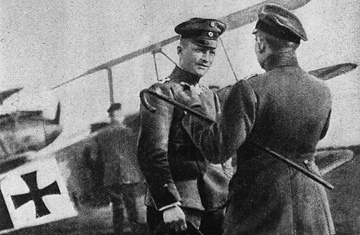
German First World War air ace Manfred von Richthofen (1882 - 1918) known as the Red Baron, leader of the 11th Chasing Squadron, with a comrade in front of his famous red tri-plane.
Snoopy dreamed about fighting him. The English revered his chivalry in combat. His red Fokker Triplane holds an iconic place in the history of aerial "dogfights." But in Germany, Manfred von Richthofen, the World War I flying ace who downed 80 Australian, British, French and Canadian planes before being shot down himself 90 years ago this month, barely rated a mention in the history books. Postwar Germany, after all, was leery of celebrating legendary warriors. But now, the star of the "Red Baron" may be rising again.
Der Rote Baron, a film opening this week in German cinemas, traces the wartime career of von Richthofen, his obsession with combat, his lionization by the Kaiser in Berlin as the poster child of the German war effort, and then his supposed love affair with a battlefield nurse who opened his eyes to the harsh realities of war.
But it is the positive tone of the treatment — "the inspirational story of one of the greatest legends," according to a trailer — that marks a break from the past. And that may reflect the fact that a country that has viewed war with deep suspicion for the past half century is now beginning to send men into combat in faraway lands. "This would not have been possible ten years ago," says Joachin Castan, author of the 2007 biography of the flying ace, Der Rote Baron. "It is now possible to ask the question in Germany, 'Can there be a war hero?'" (The film was shot in English and will probably be released outside of Germany sometime in the next year.)
When it has dealt with the subject of war on the big screen, postwar Germany has tended to view it from the dark side. Movies such as Das Boot (1981), 2004's Der Untergang (The Downfall) and Sophie Scholl (2005) explored the experience through an unwaveringly critical lens. Even the upcoming Valkyrie, a Tom Cruise movie about a German officer who tried to kill Hitler, focuses mainly on the horrors of war. Der Rote Baron, by contrast, portrays its combatant hero in a positive light. "It's a remarkable movie," the Baron's nephew, Manfred von Richthofen, told Die Welt this week. "Somehow it did not turn into a war film. The personality and especially the thoughtfulness of my uncle are true to life."
The filmmakers employed some poetic license: The movie's love affair is fictional — "complete rubbish" says biographer Castan. "The historical Richthofen was the James Dean of World War I, an idol of his time," says Castan. "[But] he had no affairs with women. He also did not drink and did not visit brothels."
The Von Richthofen legend was always more pronounced outside of Germany, in any case. A great deal was made in Britain, for example, of his supposed chivalry, a salutory example of the "good German." And it is true that on three occasions he waved his enemy to the ground rather than shooting them out of the sky. (In one case, seeing that an enemy pilot's gun had jammed, Von Richthofen waved him down to the ground, jumped out, shook his hand and then took off again.) But in other respects, Von Richthofen was "cold-blooded," says Castan. "He was mainly interested in his strike rate. He did not try to conceal the fact that he was aiming to kill."
"I never aim at the machine but shoot the pilot right away," Von Richthofen once wrote in instructions about how the "manhunt" should be practiced.
Even so, the story is a fairly good reflection of how Germans view war today. After decades of official pacifism, German soldiers are once again seeing action outside of the country, notably in Afghanistan. The government is even considering resurrecting the Iron Cross medal as a symbol of valor. At the same time, many Germans still feel a deep ambivalence about the German military. "The film," says Castan, "provides a fundamentally German perspective on World War I, with certain heroic elements. But [the Red Baron] is an ambiguous hero, who at the end sees war in a negative light. It shows how we look at war today. The tragic thing about Von Richthofen is that he was the poster hero of the Kaiserreich [the German empire] who, deep down, knows that war is senseless." With reporting by Stephanie Kirchner and Laura Laabs/Berlin
